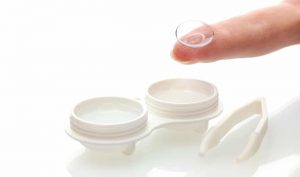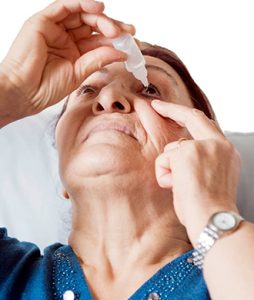Eat healthy and balanced diet:
Eyes need to be taken care from both internally and externally. Consuming diet with all the essential nutrients in right quantity is crucial for maintaining eye health. Age-related visual issues can be prevented by consuming enough nutrients such as Omega 3 fatty acids, zinc, lutein, vitamin C and vitamin E.
Eye exercise:
On a regular basis, put your eyes through a short exercise. Focus at a distant object for 15 seconds, then shift your attention to a nearby object and stare at it for an additional 15 seconds. Repeat this exercise for 4-5 times. Make it a habit to routinely do this to protect your eyes from unneeded strain and discomfort.
Adjust the Lighting:
Make sure the lighting in your office is not too harsh. Turn off a few if you can. If you can, avoid sitting near open windows because doing so will make your computer screen reflect light. You can also adjust your computer’s brightness to match the lighting in the space.
Give your eyes a rest:
When using a computer for extended periods of time, it’s possible to forget to blink, which can cause eye fatigue. Try the 20-20-20 rule to lessen eye strain: Look away for 20 seconds every 20 minutes for roughly 20 feet in front of you. Reduce mobile/computer screen time by setting a daily limit on screen time and make that time limit clear. Generally, a maximum of 1 to 2 hours is recommended.
Wear sunglasses:
Sunglasses will help protect your eyes from the UV (ultraviolet) radiation produced by the sun. Excessive UV exposure raises your risk of cataracts and macular degeneration. Choose a sunglass that blocks 99% to 100% of UVA and UVB radiation. Some contact lens offers UV protection but still sunglasses are advised as an additional layer.

Wear protective eye wear:
To decrease the effects of blue light, you can use anti-glare glasses or attach an anti-glare screen protector to your computer.
Proper Care of Contact Lenses:
People who use contact lenses must take extra precautions to protect their eyes. Caution is required while applying or removing makeup, wearing or removing contact lenses, spraying deodorant etc. Avoid wearing the lenses for long periods of time and avoid contact with dust and other foreign objects to prevent infection.
Lubricate your eyes:
Dry eyes can be caused by staring at screens, wind, and other environmental causes. Low tear production and poor tear quality are additional potential causes of this disease. To ensure that your eyes are properly moisturized, don’t forget to apply eye drops.

Stop rubbing your eyes:
When they are itchy or feel tired, many people rub their eyes. However, this makes things more uncomfortable and can even be dangerous. Therefore, try to rest them whenever possible and avoid rubbing your eyes.
Avoid smoking:
Smoking can damage the optic nerve and increases the risk of age-related eye diseases such cataracts and macular degeneration. Uveitis, an infection of the middle layer of the eye, can also be brought on by smoking.
Diabetes and Eye Health:
Potential eye problems are closely related to obesity and diabetes. Obesity and type II diabetes both raise the risk of developing glaucoma and retinopathy. Exercise, a balanced diet, and keeping blood pressure and cholesterol level within normal ranges can help with weight loss and diabetes management. This can aid to lessen risk of developing eye issues.
Get Regular Eye Check-ups:
It is recommended that you have an eye exam at least every six months. If eye strain, dry eyes, and other comparable conditions aren’t treated promptly, they might develop into serious illnesses. If any of the following symptoms continue, consult your doctor.
- irritated eye/eyes
- foreign body sensation in the eye
- stringy discharge
- eye fatigue
- heavy eyelids
- red eyes
- discomfort on wearing contact lense

